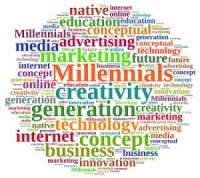There Should be No Mystery in Recruiting and Hiring Millennials
Posted on June 28, 2017

Millennials now make up more than 34% of the workforce.
According to Pew Research, millennials range from age 18 to 34 encompassing over 75 million Americans. Over 20 million of them will graduate from college by 2021 and they want careers.
How should employers in the LBM industry recruit from this burgeoning labor pool? What’s the mystery to solve in hiring them?
First, companies must look beneath the surface. An entire generation spanning from new graduates to professionals with over 10 years of experience cannot be stereotyped. While they may be more social media addicted and tech savvy, millennials share a lot of common ground with their older peers when it comes to job satisfaction.
With unemployment below 5%, companies will compete fiercely for qualified candidates. When tailoring recruiting strategies to millennials keep these factors in mind:
Growth: Growth is one of the most critical factors millennials look for in a company. The majority of workers in this generation want a career in which they can flourish. Companies that offer rotation or development programs early in employee tenure often succeed in attracting top millennial talent. In the interview process, be sure to highlight opportunities for professional development and the dynamic career paths of your managers and executives.
Employee Satisfaction: Are your current employees satisfied? This may seem odd when thinking about fresh talent, but we live in a world where reviews matter and employee satisfaction is publicized on the internet. Before applying for jobs, most applicants will read reviews on Glassdoor and other online platforms. There will always be unsatisfied employees that write poor reviews. However, if reviews are overwhelmingly bad, that raises a red flag and deters strong applicants from applying in the first place.
Company Culture: Millennials want to value the organizations they work for. Company culture shapes the everyday work environment and inspires employees to stay for the long haul. Millennials want to feel valued as individuals and look for cultures that promote development and leadership. Young workers also look for strong leaders to whom they can look for mentorship and inspiration. Culture will not only attract the best millennials to apply to your company but will also retain them once on board.
Meaningful Work: Along with growth, millennials want more out of their jobs than a paycheck. They want their work to mean something. Whether supporting a greater societal need or developing people, they desire fulfillment beyond completing tasks and punching the clock. Think about how your organization contributes to the community, creates jobs or solves problems and be prepared to discuss meaningful work in an interview with a millennial prospect.
Compensation: When hiring you get what you pay for. This applies to the entire compensation package beyond base salary. Millennials grew up during the Great Recession and many come saddled with student loan debt. On top of a livable wage they want competitive retirement plans to prepare responsibly for the future. If your company offers profit sharing, comprehensive healthcare benefits, tuition assistance or an employee stock purchase plan, make sure to publicize these benefits clearly on your company’s website and in the job posting.
Online Presence: Make sure your website is aesthetically pleasing, modern and professional. Many millennials on the job hunt will dismiss a company entirely if its website looks like it launched in 1999. Dedicate someone from your HR or marketing team to regularly update social media pages and actively interact with prospects on LinkedIn.
Flexibility: Many notable corporations are increasing paid time off in response to growing demand for flexibility from millennial workers. If your company requires employees to work on site, then evaluate if you offer ample vacation and flex days. Standard vacation time now starts at about three weeks. Millennials are incredibly hard working but place higher value on work-life balance and travel than their predecessors.
Industry Benefits: For new graduates or those making a career change, you may need to sell your industry as well as your company. In a volatile economic environment make sure to highlight the advantages of working in the Lumber and Building Materials industry. As an industry, we experience fewer market crashes and layoffs. We often lead the economy out of economic downturns. People will always live in homes which creates a permanent need for materials. Our industry doesn’t fall victim to changes in consumer tastes or obsolescence. Many young workers will be attracted to an industry with staying power knowing their skills will retain value in the long run. In the interview don’t solely focus on your company, but speak about the benefits of the LBM industry as a whole.
Tell the Story: As an industry we can tell many success stories of people who entered with no experience and grew to lead the companies they work for, from small mom and pops to large national companies. We need to share these stories, lead our new hires to success and ask them to help write their own stories through hard work and dedication.
Overall, millennials look for value in their careers. If you take care of them, they will take care of you. Younger workers want to work for a company they believe in and where they feel appreciated. Competitive compensation, flexibility and modern technology are important, but culture, leadership and opportunity for growth will truly attract and retain workers of this generation.
Mark Barnard is President and CEO of SnapDragon Associates, LLC a LBM Executive Recruiting Firm. SnapDragon works with Best in Class manufacturers, distributors and retailers across the US.
www.snapdragonassociates.com 603-621-9037 mark@snapdragonassociates.com





